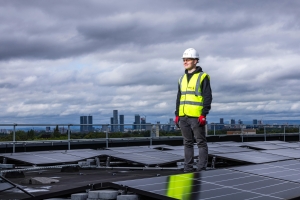Clean Energy Canada | Canada can build for the present and future, but not the past
June 9, 2025

TORONTO — Rachel Doran, executive director of Clean Energy Canada, made the following statement in response to the Government of Canada’s proposed legislation to build “One Canadian Economy.”
“As our largest trading partner and key ally threatens to unfriend Canada, business as usual is not an option. Accordingly, the One Canadian Economy bill, tabled late last week, provides a framework for removing federal internal trade barriers and advancing national interest projects, aiming to ‘strengthen the Canadian economy, diversify our trade relations and increase domestic productivity, resilience, and competitiveness.’
“To seize opportunities in the global energy transition and ensure the resilience of our economy with the required urgency, Canada must build the foundations of our growing clean economy today. This bill is an important step to lowering barriers and transaction costs across the country, but Canada needs to ensure the clean economy is a central focus of ongoing efforts to unlock interprovincial trade and identify priority projects.
“With investment in clean technologies on track to be 50% higher globally this year than the total amount spent bringing oil, natural gas, and coal to market, our future prosperity depends on our ability to build up industries set to prosper in the energy transition. Given Canada’s clean energy advantages and the direction all of our biggest non-U.S. trade partners are going, clean economic growth must be at the top of the agenda—both when deciding which projects are in the national interest and when breaking down internal trade barriers.
“Last week’s introduction of the Free Trade and Labour Mobility in Canada Act is key to removing federal barriers to the interprovincial trade of goods and services while improving labour mobility within Canada. As the Carney government moves quickly to remove these barriers, measures that unlock clean growth should be placed at the top of the list.
“This means ensuring workers required to build clean economy projects (such as geologists, engineers, EV mechanics, wind turbine technicians, and heat pump installers) are prioritized in labour mobility efforts to build clean growth projects faster, as well as exploring opportunities for greater harmonization between provinces on building codes to enhance energy efficiency and advance electricity interconnections.
“We were pleased to see ‘contribute to clean growth and to Canada’s objectives with respect to climate change’ included in the Building Canada Act. The success of this new approach will depend on which factors are considered and how, including both the importance of Indigenous leadership and Canada’s climate goals.
“The government’s focus should be on building a clean economy that will make life more affordable for Canadian families while improving competitiveness. Canada has an opportunity to build for both the present and the future—but one can never rebuild the past.”
KEY FACTS
- Bill C-5 lays out the following factors to be taken into account in considering whether a project is in the national interest.
- Strengthen Canada’s autonomy, resilience and security;
- Provide economic or other benefits to Canada;
- Have a high likelihood of successful execution;
- Advance the interests of Indigenous Peoples; and
- Contribute to clean growth and to Canada’s objectives with respect to climate change.
- Of Canada’s 10 largest non-U.S. trade partners, all have net-zero commitments and carbon pricing systems, and roughly half apply carbon border adjustments on imports and have domestic EV requirements reshaping their car markets. Read Clean Energy Canada’s report.